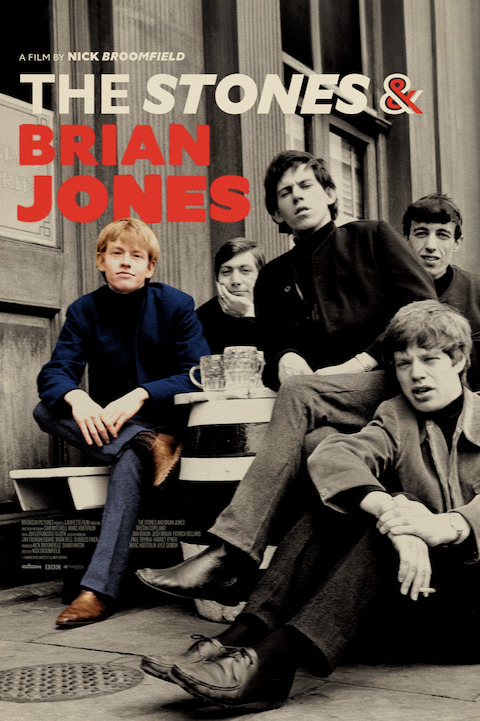
Synopsis : Featuring revealing interviews with all the main players and unseen archive released for the first time, The Stones and Brian Jones explores the creative musical genius of Jones, key to the success of the band, and uncovers how the founder of what became the greatest rock’n’roll band in the world was left behind in the shadows of history.
Genre: Documentary, Music
Original Language: English
Director: Nick Broomfield
Producer: Nick Broomfield, Shani Hinton, Marc Hoeferlin, Kyle Gibbon.
Release Date (Theaters): Limited
Release Date (Streaming):
Box Office (Gross USA): $41.5K
Runtime:
Distributor: Magnolia Pictures
Production Co: Lafayette Film

Exclusive Interview with Director Nick Bloomfield
Q: The Rolling Stones are one of the biggest bands on the planet. But far less people know about its founder/songwriter and original guitarist Brian Jones, particularly younger generations. What was the reason that you wanted to tackle the late Brian Jones’ story?
Nick Bloomfield: It’s a portrait of a particular time in history, the ‘60s. we’re still obviously benefiting from that incredible time of experimentation and artistic talent that came out of that explosion, with all the freedom that happened after the Second World War. Jones was very much a part of that search for freedom. He formed The Stones at a time when there weren’t really any other rock and roll bands of that type. It was uncharted territory and was a whole new beginning.
We can look back at that history now with a lot more knowledge and understanding than at that time. This was a time before rehabilitation clinics, psychiatrists and therapists all of which we have up to the wazoo. It was a very wild time, the time when I was growing up. I wanted to look at this very complicated individual and who [he really] was, extremely talented, but not equipped to deal with that kind of excessive freedom which had no real boundaries to it.
Q: Maybe 15 or 16 years ago, there was a movie called “Stoned,” a feature film about Brian Jones. they didn’t get the rights and couldn’t use any of the music. How important was it for you to get the music rights and some interviews of the real voice of Jones?
Nick Broomfield: You need the music to understand that particular period of time. This film looks at their beginnings — at the most exciting period in any artist’s life — how they started, what they were up to, what influenced them and what they brought to it. At that time when I was filming, they were mainly doing covers. One of the things that was really interesting was that Brian Jones in particular brought these sort of crazy musical arrangements with a mellotron or a flute or that wild guitar music in playing it black to their music, which made it very distinctive and different from other music.
The music was absolutely crucial to have and it was difficult to get it. As with anything in the music industry, there were a lot of legal issues, one had to get over to include the music in the film. You brought up “Stoned.” The [premise] of “Stoned” is entirely wrong — the notion that he was murdered. I think if you look at this film, you realize that he was somebody who was going to pieces and no one needed to murder him. He was murdering himself.
Q: Brian Jones’ insecurity had a lot to do with his parents and their attitude towards the direction of his career. That was really unfortunate. But insecurity preyed on him — he wanted to be a better guitar player and singer along the way. What do you think about that?
Nick Broomfield: Insecurity drove him to the blues. He felt the blues were something that he really identified with. He felt that he grew up in this very strange British town Cheltenham, which is really the British center for spying. All the spies go to Cheltenham. It was almost like the blues were going to be his salvation. Maybe he found out that they weren’t.
Even though he was very successful, he didn’t achieve the nirvana he was looking for. I think that insecurity drove him to look for a safe place to be and it drove him to do amazing arrangements with the instruments and stuff. But that insecurity also caused him not to have much belief in his own songwriting abilities. He didn’t really believe enough in himself to write a song and put it out there and he didn’t have the security that Mick Jagger or Keith Richards had to put their songs out there and risk being ridiculed or people not liking them.

Q: The sound of the Stones came from blues singers such as Muddy Waters and Robert Johnson. Elvis Presley also had a lot of influence on black music when he was growing up. That was really intriguing.
Nick Broomfield: That was the music [of the time], wasn’t it? It was great. It was the best music but I think because of the inherent [racism of the time] I think it was ironic that it took the Stones to introduce White America to Muddy Waters and Howling Wolf and all the rest of it. One thing that was amazing was that Brian loved these black musicians, they all did.
They admired these musicians so much that they would have them opening for them when they played in America and then put them on mainstream television. It was a great thing that happened and I guess it helped with that sort of incredible racial barrier in the States to actually get their music accepted. ironic really that it took White Brits to do it.
Q: Even after seeing this film, I can’t really grasp who Brian Jones is. There’s the one side you show that he impregnated women and left them more than a few times. When you listen to the women such as Linda Lawrence, she said he was very soft spoken and very talented. After you made the film, what’s your impression about Brian Jones?
Nick Broomfield: He’s a really complicated person and is very hard to know especially at first when you read about him and some of the things he did in his life. One is tempted to judge him very harshly. He got all these women pregnant and left them. He obviously had a very cruel streak in him. Yet, there was another side of him which was that he was like a little boy. He was talented and yet so strangely lost.
He ended up with all these girls, often to try and find another home and the girls’ mothers would look after him and iron his shirts. He was just a middle-class kid who was very much rejected by his parents who felt that he wasn’t going to get a professional job. He wasn’t going to be a barrister, solicitor or a doctor. They really disapproved of his being in a band and he was unable to ever get their approval because he was so young. it really mattered to him.
Check out more of Nobuhiro’s articles.
Here’s the trailer of the film.

